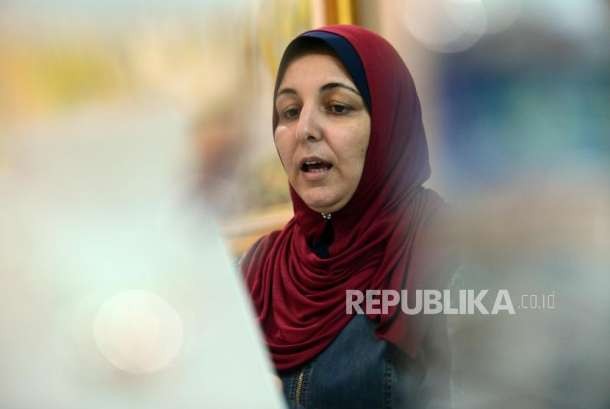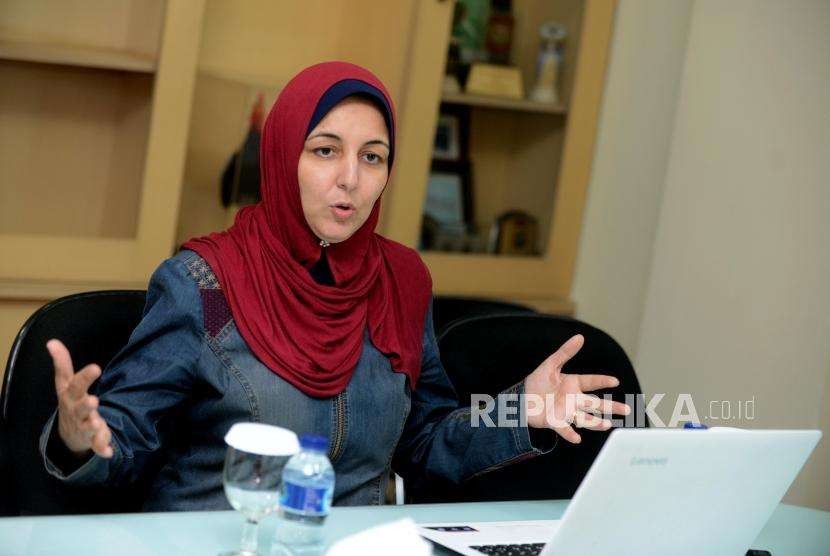REPUBLIKA.CO.ID, JAKARTA -- Abeer Z Barakat got emotional when she described the pain of Palestinian people living in Gaza Strip. Sometimes, she seemed out of words when trying to share some of the stories, but somehow her facial expression spoke the unspoken words.
“We’re not only losing properties, but also life,” said Abeer during a visit to Republika office on Friday (Aug 3).
Abeer was an English lecturer at University College of Applied Sciences (UCAS) in Gaza Strip. She was also known as activist who support "Great March of Return" action on Gaza-Israel border in March. Abeer left her hometown to study at University Putra Malaysia (UPM).
During her visit to Republika office, Abeer shared her experience while living in Gaza, an area that has been blocked for more than 10 years by Israel. Not only that, Israel also launched several massive aggressions to the area.

Activist Great March of Return Abeer Z Barakat visits Republika office, Jakarta, on Friday (Aug 3).
One of the deadliest attacks occurred in July 2014. At that time, Israel reportedly launched more than 1,300 airstrikes into Gaza. At least 1,800 Palestinians were killed in the attack, while around 10,000 others were injured.
“The war in 2014 was very devastating, many people whose homes were destroyed had to live in school buildings, and no one could come to Gaza to help us," Abeer remarked.
Israeli blockade around Gaza for more than a decade has also caused the downfall on economy. Abeer revealed, Gaza has advantages in three business sectors, namely furniture, garment and agriculture.
However, the blockade has intercepted import-export of the goods, the production and sales process has been stalled. As the business slumped, people begin to lose income, then many parents could not send their children to school.
“When we can’t send our children to school, we have generations that are not educated," said Abeer.
More over, Abeer said a number of children in Gaza had cancer. One of the causes was the lack of clean water supply.
“Water in Gaza is contaminated and tastes salty because we are close to the sea,” Abeer added.
The sea around Gaza is contaminated due to the entire stream of sewage ended there. Another problem that has gripped Gaza is the lack of electricity, medical facilities and medicines. Those things made the lives of people there become worse.
Almost two million people trapped inside the 60-kilometre wall built by Israeli forces. They lived with limited electricity supply for three to four hours per day.
However, the people in Gaza did not let the situation restrict them to communicate with others through the internet. Power supply was built to enable them to turn on internet modem.
Social medias are important for Palestinian people in Gaza. In fact, internet was the only thing that entertain them.
"The funny thing is, although the electricity is turned off, but you can see many people in Gaza still can go online on Facebook,” Abeer said.
They also utilized social medias to share stories with the outside world. They delivered the latest news and got informed on newest attacks occured in Gaza from social medias.
Abeer explained Gaza people would never forget initial cause that made them suffered greatly. It began in 1967, when Israel forced them to leave from their land and made them live as refugees.
“I’m a refugee in my own country,” Abeer asserted.
Every March 30, Palestinians in Gaza commemorate the Land Day to remember the killings in 1967. In 2018, Gaza people also staged "Great March of Return" to keep the pressure on Israel and to reinvigorate the issue of refugees.
Abeer said Great March of Return is a peaceful rally with a key symbol. She explained, the key symbolize people would only leave awhile to return home.
Although the situation near Gaza-Israel border always unpredictable, many people brought their children to participate on Great March of Return. Abeer said they wanted to teach younger generation why they have to defend the land.
However, Israeli security forces often shoot Palestinian adults and children who participate on Great March of Return. The shots were directed at the face, hands, feet, chest, and even private body parts of the action participants. There were also shots that aim directly to kill.
“Many people, including children must be amputated due to their injuries, then we have new generation that is disabled in Gaza, also orphan generation,” Abeer said.
Many people outside Gaza often asked her, why should Great March of Return action is staged when the stake is high. She explained Palestinians people believe they will be able to get back their right to the land.
Abeer also thanked Indonesian people with their tremendous support to Palestina independence. "Indonesia has provided very large funds, not only financially, but also spiritually," she said.


